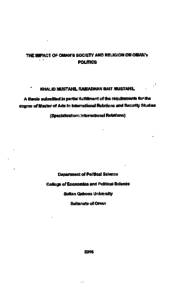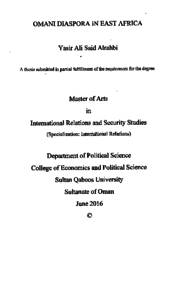Document
The impact of Oman's society and religion on Oman's politics
Publisher
Sultan Qaboos University
Gregorian
2016
Language
English
Subject
English abstract
In contrast to common perspectives that political modernisation equates to secularisation and a separation of religion from politics, this study attempts to show how the firm integration of religious and traditional social principles have been essential elements in the modernisation of the Sultanate of Oman's politics and political system since 1970. This incorporation of tradition with modernity helps explain Oman's unique internal stability and consistently neutral standing within a turbulent Middle East region.
This research applies a qualitative and political-historical approach to address the hypothesis. In Oman, "Good Neighbourliness" principles and traditional social methods were developed and adapted to shape the politics of the modern state. The key values that can be discerned in the Omani political formula are toleration, pragmatism and neutrality in relation to good neighbourliness, which seems to have promoted harmonious relations within Oman, and across its regional environment stretching back to Oman's long interaction with the Islamic world, the Indian Ocean and East Africa. Since the eighth century, the date of embracing the Ibadism school of Islamic thought, patterns of ethics in Oman have become entrenched and a set of common morals were passed from generations to generations.
Over the years, traditional good neighbourliness principles that have come into existence include: not intervening in others domestic affairs, a duty to refrain from any inconsistent behaviour in international relations, not making threats against the territorial integrity or political independence of any state. Furthermore, it includes a duty to settle international disputes by peaceful means in such a manner that international peace, security and justice are not endangered, a duty to respect the principle of equal rights and selfdetermination of people, and the duty to respect the principle of sovereign equality of states. Through a broad political-historical analysis, this research shows that these main principles can be traced to the nature of Oman's society and religion, and consequently underpin the politics and foreign policy of the Sultanate of Oman. A unique management and application of foreign policy has been generated to organize, maintain, and pursue traditional "Good Neighbourliness" with all countries around the world. This is, however, not a new innovation but perhaps a revival or renaissance of previous traditions. This research examines the impact of Oman's society and religion on its politics and evaluates the implementing of the concept of traditional good neighbourliness as a basis of Oman's social structure, religious principles and political system in terms of administration and leadership.
Member of
Resource URL
Arabic abstract
خلافا للمنظور الشائع أن التحديث السياسي يعادل العلمانية ومفهوم فصل الدين عن السياسة، فإن هذه الدراسة تسعى إلى توضيح أهمية دمج المبادئ الدينية والإجتماعية كعناصر أساسية في تحديث سياسة سلطنة عمان ونظامها السياسي منذ سنة 1970. هذا الدمج مابين التقاليد والحداثة يساعدنا على فهم طبيعة الاستقرار الداخلي الفريد من نوعه في عمان وثبات مكانتها المحايدة في خضم الاضطراب السائد في منطقة الشرق الأوسط.
ولقد اعتمد هذا البحث على طريقة النوعية والاستشهاد بالأحداث التاريخية السياسية السابقة والمعاصرة للتعامل مع فرضية البحث. حيث تم تطوير الأساليب الإجتماعية التقليدية في عمان لتشكيل سياسة الدولة قديما وحديثا وفقا لمبادئ "حسن الجوار". اذ يعتبر التسامح والواقعية والمحايدة من القيم الأساسية التي يمكن استخراجها من معادلة السياسة بعمان والتي ساهمت في تحسين العلاقات المتناغمة داخل السلطنة وخارجها، بما فيها العالم الإسلامي، المحيط الهندي وشمال افريقيا. كما ترسخت أنماط اخلاقية دينية مع مجموعة من الأخلاق التقليدية المشتركة التي توارثها الأجيال من بداية القرن الثامن الميلادي، منذ اعتناق الفكر الإسلامي الإباضي في عمان.
وبمرور السنين، بدأت مبادئ حسن الجوار تأتي إلى حيز الوجود لتشمل: عدم التدخل في سياسة الدول الداخلية وجوب الإمتناع عن التصرف غير المتناسق في العلاقات الدولية، عدم تهديد السيادة الإقليمية أو السياسة المستقلة لأي دولة، وجوب حل النزاعات الدولية بطرق سلمية تضمن السلام والأمن والعدالة الدولية، وجوب احترام مبدأ المساواة في الحقوق وتقرير المصير للشعوب وأخيرا وجوب احترام مبدأ المساواة بين الأمم في السيادة. هذا البحث فييين من خلال تحليل سياسي تاريخي واسع- أن هذه المبادئ تعود إلى طبيعة المجتمع والدين في عمان، وهي بالتالي تشكل قاعدة السياسة الداخلية والخارجية للسلطنة. مما ساهم في تحقيق إدارة سياسة خارجية فريدة من نوعها بهدف التوازن والمحافظة على مبدأ حسن الجوار مع جميع دول العالم. ولكن هذا لا يعد ابتكارا جديدا بقدر ما هو بمثابة إحياء او نهضة للتقاليد السابقة. هذا البحث يسلط الضوء على تأثير المجتمع والدين على السياسة في سلطنة عمان ويقيم مفهوم حسن الجوار كأساس للبنية الاجتماعية والمبادئ الدينية والنظام السياسي من ناحية الإدارة والقيادة.
ولقد اعتمد هذا البحث على طريقة النوعية والاستشهاد بالأحداث التاريخية السياسية السابقة والمعاصرة للتعامل مع فرضية البحث. حيث تم تطوير الأساليب الإجتماعية التقليدية في عمان لتشكيل سياسة الدولة قديما وحديثا وفقا لمبادئ "حسن الجوار". اذ يعتبر التسامح والواقعية والمحايدة من القيم الأساسية التي يمكن استخراجها من معادلة السياسة بعمان والتي ساهمت في تحسين العلاقات المتناغمة داخل السلطنة وخارجها، بما فيها العالم الإسلامي، المحيط الهندي وشمال افريقيا. كما ترسخت أنماط اخلاقية دينية مع مجموعة من الأخلاق التقليدية المشتركة التي توارثها الأجيال من بداية القرن الثامن الميلادي، منذ اعتناق الفكر الإسلامي الإباضي في عمان.
وبمرور السنين، بدأت مبادئ حسن الجوار تأتي إلى حيز الوجود لتشمل: عدم التدخل في سياسة الدول الداخلية وجوب الإمتناع عن التصرف غير المتناسق في العلاقات الدولية، عدم تهديد السيادة الإقليمية أو السياسة المستقلة لأي دولة، وجوب حل النزاعات الدولية بطرق سلمية تضمن السلام والأمن والعدالة الدولية، وجوب احترام مبدأ المساواة في الحقوق وتقرير المصير للشعوب وأخيرا وجوب احترام مبدأ المساواة بين الأمم في السيادة. هذا البحث فييين من خلال تحليل سياسي تاريخي واسع- أن هذه المبادئ تعود إلى طبيعة المجتمع والدين في عمان، وهي بالتالي تشكل قاعدة السياسة الداخلية والخارجية للسلطنة. مما ساهم في تحقيق إدارة سياسة خارجية فريدة من نوعها بهدف التوازن والمحافظة على مبدأ حسن الجوار مع جميع دول العالم. ولكن هذا لا يعد ابتكارا جديدا بقدر ما هو بمثابة إحياء او نهضة للتقاليد السابقة. هذا البحث يسلط الضوء على تأثير المجتمع والدين على السياسة في سلطنة عمان ويقيم مفهوم حسن الجوار كأساس للبنية الاجتماعية والمبادئ الدينية والنظام السياسي من ناحية الإدارة والقيادة.
Category
Theses and Dissertations


